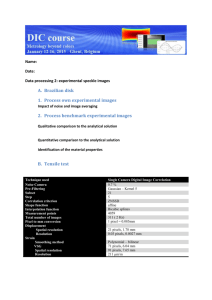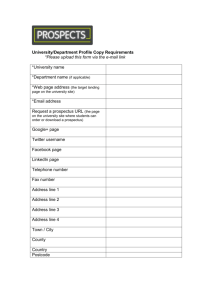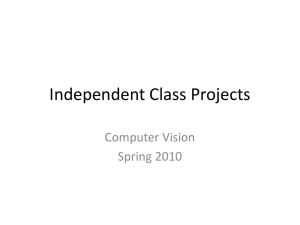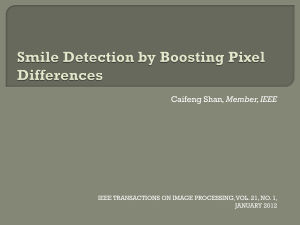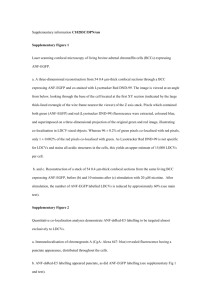Ultimate Guide to Social Media Image Sizes
advertisement
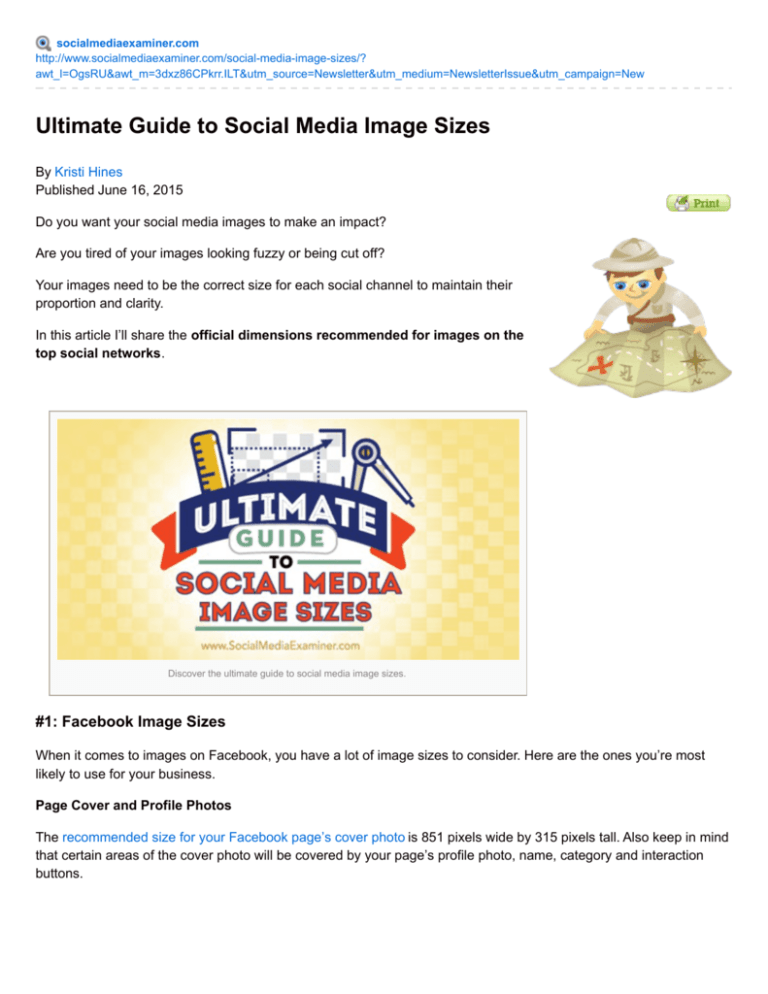
socialmediaexaminer.com http://www.socialmediaexaminer.com/social-media-image-sizes/? awt_l=OgsRU&awt_m=3dxz86CPkrr.ILT&utm_source=Newsletter&utm_medium=NewsletterIssue&utm_campaign=New Ultimate Guide to Social Media Image Sizes By Kristi Hines Published June 16, 2015 Do you want your social media images to make an impact? Are you tired of your images looking fuzzy or being cut off? Your images need to be the correct size for each social channel to maintain their proportion and clarity. In this article I’ll share the official dimensions recommended for images on the top social networks. Discover the ultimate guide to social media image sizes. #1: Facebook Image Sizes When it comes to images on Facebook, you have a lot of image sizes to consider. Here are the ones you’re most likely to use for your business. Page Cover and Profile Photos The recommended size for your Facebook page’s cover photo is 851 pixels wide by 315 pixels tall. Also keep in mind that certain areas of the cover photo will be covered by your page’s profile photo, name, category and interaction buttons. Facebook cover photo and profile photo example. Your profile photo should be 160 pixels wide by 160 pixels high. If you upload an image that doesn’t fit these dimensions, you’ll be asked to crop and reposition the image to make it fit. Ad Images For all Facebook ad objectives, the recommended width for the images used in your ads is 1,200 pixels. Then, depending on your ad objective, the image height should be 444 pixels (for the Page Likes and Event Responses objectives), 675 pixels (for the Video Views objective), 900 pixels (for the Page Post Engagement objective) or 628 pixels (for all other objectives). The reason for these recommended sizes is to ensure that your ad image is displayed at the highest quality for all ad sizes. For example, the Page Likes ad image is displayed at 470 pixels wide by 174 pixels high in the desktop news feed, 560 pixels wide by 208 pixels high in the mobile news feed and 254 pixels wide by 94 pixels high in the right column. Facebook ad image examples. For the new carousel displays that allow you to share three to five images with the Clicks to Website and Website Conversions ad objectives, your images should be 600 pixels wide by 600 pixels high. Facebook carousel ad image examples. You can refer to this handy chart for an overview of image sizes based on ad objective, or the Facebook Ads Guide for specifics on how each ad objective is displayed in the desktop news feed, mobile news feed and right column. This guide also tells you how many characters you can have in the text, headline and link description areas (if applicable) for each ad objective. Also, remember that you can have a maximum of 20% text in your ad images. Use Facebook’s Grid Tool to check your image if you want to ensure it doesn’t go over the 20% limit. Posts to Your Profile or Page Image sizing for the desktop news feed varies. Since the recommended ad image sizes are 1200 pixels wide, the same can be applied to images in posts to your profile or page. You can go as small as 470 pixels since that’s the size that ad images are resized to in the desktop news feed. However, note that when someone clicks on the image, it won’t take up the full space of the lightbox. For example, this is how a 1200 pixel wide by 1200 pixel high image looks when posted as a photo to your page. Example of a specific size photo post on a Facebook page. The recommended image size for ads with photo posts is 1,200 pixels wide by 900 pixels high, which looks like this when posted to your page. Example of a specific size photo post on a Facebook page. The recommended image size for ads with link previews is 1200 pixels wide by 628 pixels high, which looks like this when posted to your page. Example of a link post with a specific size photo preview on a Facebook page. What happens if your image doesn’t fit the right proportions, such as a 1200 pixel wide by 1719 pixel high image for a photo post? You simply don’t get to use the full width of the posting box. Example of a specific size photo post on a Facebook page. For a link preview image, if you use a larger-than-recommended size, you lose the ability to choose what part of the image is shown. Example of a link post with a specific size photo preview on a Facebook page. What happens if your image is smaller, such as 341 pixels wide by 178 pixels high? Again, you no longer get to use the full width of the posting box. Example of a specific size photo post on a Facebook page. These examples show that while you can use different-sized images from what Facebook recommends, their recommended sizes will make your posts look the best on your page, profile and news feed. Group Cover Photo If you’re running a Facebook group, the group cover photo size must be at least 400 pixels wide by 150 pixels high. For a higher-quality image, aim for 800 pixels wide by 300 pixels high. Example of a Facebook group cover photo. If you don’t choose a cover photo, Facebook shows profile photos of group members instead. #2: Twitter Image Sizes Next on the list for social media image sizes are images for Twitter. Header and Profile Photo When customizing your Twitter account’s header photo, the recommended size is 1500 pixels wide by 500 pixels high. Note that your profile photo will overlap a portion of your header photo. Examples of a Twitter header and profile photo. Your profile photo should be uploaded at 400 pixels wide by 400 pixels high, although it will be displayed at 200 pixels wide by 200 pixels high. Images in Tweets While Twitter doesn’t officially recommend a specific photo size for your tweets, Canva offers a template for Twitter posts at 1024 pixels wide by 512 pixels high. Template size for Twitter images in posts. Using this image size also ensures that you have a high-quality image for a promoted tweets campaign. Images in Cards Twitter gives you the option of optimizing your website content with Twitter cards. These cards format tweets of your website content in a specific way, like the summary card with large image shown below. Twitter summary card with large image example. Each card type has a specific image size that works best, which you can review in the Twitter support center. While there are minimum sizes that you must meet, such as 280 pixels wide by 150 pixels high for the summary card with large image, the image may be enlarged for other types. The photo card, for example, displays images at a maximum width of 560 pixels and maximum height of 750 pixels. Ad Images If you’re using a lead generation card to capture leads through Twitter advertising, the minimum image size is 600 pixels wide by 150 pixels high, as shown in the image below. Twitter lead generation card example. For the website click campaign, you set up a website card. The minimum image size is 800 pixels wide by 320 pixels high. Twitter website card example. Promoted tweets with an image use the same image size as any tweet with an image: 1024 pixels wide by 512 pixels high. #3: LinkedIn Image Sizes LinkedIn offers specific image-sizing recommendations for profiles, pages, updates and ads. Professional Profile Background and Profile Photo To customize your personal profile on LinkedIn, you can add a background photo. On the help page, LinkedIn recommends images that are between 1,000 pixels wide by 425 pixels high and 4000 pixels wide by 4000 pixels high. When you upload a background photo to your profile, LinkedIn suggests using an image that’s 1400 pixels wide by 425 pixels high for the best results. Note that a large portion of your background photo will be covered by the top section of your profile. Example of a LinkedIn background photo for a personal profile. The recommended size for your profile photo is 400 pixels wide by 400 pixels high. Company Page Banner and Logos On your LinkedIn company page, you can add a banner image and logo for your company. The recommended size for your banner image is a minimum of 646 pixels wide by 220 pixels high. Example of a LinkedIn company page standard logo and banner. Your standard logo should be 100 pixels wide by 60 pixels high, and your square logo should be 50 pixels wide by 50 pixels high. Showcase Page Hero Image and Logos Showcase pages are pages that focus on your specific products or services under your company page. LinkedIn recommends that a showcase page’s hero image is a minimum of 974 pixels wide by 330 pixels high. Example of a LinkedIn showcase page hero image and standard logo. Your standard logo should be 100 pixels wide by 60 pixels high, and your square logo should be 50 pixels wide by 50 pixels high. Ad Images The recommended image size for LinkedIn self-serve ads is 50 pixels wide by 50 pixels high. LinkedIn offers an example of an effective ad image versus a non-effective ad image, as shown below. Example of best practices for LinkedIn self-serve ad images. The recommended image size for sponsored updates is 800 pixels wide by 400 pixels high. Example of a LinkedIn sponsored update with a photo. For link previews, the image thumbnail is resized to fit 180 pixels wide by 110 pixels high. Posts to Your Profile or Page There are no specific image size recommendations for photos uploaded directly in a post to your profile or page. Your best bet is to go with the recommended image size for sponsored updates of 800 pixels wide by 400 pixels high. For link previews, the image thumbnail is resized to fit 180 pixels wide by 110 pixels high. Group Logos LinkedIn removed the cover photo/banner image for groups. What remains are the group logos. Your group logo should be 100 pixels wide by 60 pixels high, and your small logo should be 50 pixels wide by 50 pixels high. Example of a LinkedIn group standard logo. The cover photo/banner image was removed so that group members could get straight to the discussions. #4: Google+ Image Sizes Google+ allows you to utilize images in many ways on the network. Cover and Profile Photo The smallest photo size you can use for your page or profile cover photo is 480 pixels wide by 270 pixels high. The recommended size for the cover photo is 1080 pixels wide by 608 pixels high, with a maximum size of 2120 pixels wide by 1192 pixels high. Example of a Google+ page cover and profile photo. Your cover photo is placed to the right of your profile photo and basic page or profile information. The smallest size you can use for your profile photo is 250 pixels wide by 250 pixels high, although a larger size is recommended. Post Photos Post photos in the news feed display in different sizes, without specific recommendations by Google+. To get the most attention in the news feed, you can go with taller images with a minimum width of 497 pixels, like the one in the right column below. Example of a tall photo in the Google+ news feed. Or you can go with image sizing with a minimum of 900 pixels wide by 600 pixels high to possibly get stretched across the news feed. Example of a three-column photo display in the Google+ news feed. Note that these are photos directly uploaded to Google+. Link preview image thumbnails are displayed at 150 pixels wide by 150 pixels wide. Collection Cover Photo Google recommends that cover photos for collections be 480 pixels wide by 270 pixels high. You’ll see this recommendation if you attempt to upload a photo smaller than this size. Example of a collection cover photo. Community Profile Photo If you run a Google+ community, your community’s profile photo must be a minimum of 960 pixels wide by 540 pixels high. Example of a community profile photo. You’ll see this recommendation if you attempt to upload a photo smaller than this size. +Post Ads Google’s +Post Ads (available through Google AdWords for pages with a minimum of 1,000 followers) offer a variety of ad sizes from which to choose. The sizes include 300 x 250, 728 x 90, 160 x 600, 320 x 50 (mobile), 120 x 600, 300 x 600, 250 x 250, 336 x 280, 580 x 400, 468 x 60 and 970 x 90. Note that these ads aren’t shown in the Google+ news feed, but rather throughout the Google Display Network. #5: YouTube Image Sizes While YouTube is focused on video, there are a few key images that need to be sized correctly for optimal results. Channel Art and Profile Photo YouTube offers a spec sheet of image sizes to use on the network. For starters, you have channel art (similar to a cover photo) that’s 2560 pixels wide by 1440 pixels high. Example of YouTube channel art and a profile photo. This image is scaled based on device. For example, the default area shown on a desktop browser is 1546 pixels wide by 423 pixels high. Note that your profile photo overlays the channel art. The minimum size for your profile photo is 98 pixels wide by 98 pixels high, but it’s recommended that you upload an image that’s 800 pixels wide by 800 pixels high. Video Thumbnails To encourage more people to watch your videos, verified YouTube users can upload custom video thumbnails. The recommended size for your thumbnail image is 1280 pixels wide by 720 pixels high, although you can drop down to a minimum of 640 pixels wide. Examples of YouTube video thumbnails. Larger is better in this case, especially if you’re uploading HD-quality video. Ad Images YouTube offers many advertising options to choose from, each of which allows you to upload custom images, such as the custom thumbnail image at 1280 pixels wide by 720 pixels high. Examples of video thumbnails for YouTube ads. Be sure to reference YouTube’s Display Specs Help page to learn more about custom image sizes that you can use with your YouTube advertising. #6: Pinterest Image Sizes Since Pinterest is focused on images, paying attention to recommended image sizing is especially important on this network. Profile Photo Your Pinterest profile photo should be 165 pixels wide by 165 pixels high. Example of a Pinterest profile photo. Board Cover Image You can customize the cover image for each of your Pinterest boards by using a portion of an image from any pin within that board. Sources vary about the exact size of the cover image, from 217 pixels wide by 147 pixels high to 222 pixels wide by 150 pixels high. Examples of board cover images. Since you can’t upload a specific board cover image, you need to choose a pin within the board that has a standout section to crop. Pins Pinterest doesn’t offer specific size guidelines for regular pins. They do, however, have a recommendation for promoted pins, which you can use as a guide for all of your pins. The Promoted Pins Creative Guide recommends a minimum width of 600 pixels with a height between 900 pixels and 2100 pixels. This should ensure the best display of your pin without getting cut off in feeds. Examples of tall images in Pinterest pins. In the news feed and on your boards, pins will be displayed at a width of 236 pixels with a proportionately scaled height. When expanded, the pin will be displayed at 735 pixels wide with a proportionately scaled height. #7: Instagram Image Sizes Since Instagram also focuses heavily on images, image sizing matters. Fortunately, it’s pretty simple. Profile Photo The suggested size for your profile photo varies across multiple sources from 110 pixels wide by 110 pixels high, to 161 pixels wide by 161 pixels high. Example of an Instagram profile photo. Note that Instagram profiles don’t have specific cover photos. Your cover photo is created by the images you share on your Instagram profile. Post Images Instagram post images have increased in size, allowing you to upload images at 1936 pixels wide by 1936 pixels high. Example of an Instagram image post. The display on a desktop browser will show images scaled down to 612 pixels wide by 612 pixels high. How Much Does Image Size Matter? After reading all of these specifications, you might be wondering when image size really matters. Following specific image size recommendations is most important in the following two areas: Images that represent your brand throughout a social network (profile photos, logos, cover photos and banners) should be sized appropriately so you always make a good first impression when people encounter your brand. Images that you use in a social media ad or sponsored update should be sized appropriately so you make a great impression with paid media. Do you need to be concerned with image size every time you post an update to a social network? Not always, as most social networks do a good job of resizing images you give them to fit their layout. If you’re posting content that you want to do particularly well with social shares, keep recommended image sizes in mind. What do you think? Have you found that using a specific image size drives better results for your social media campaigns? If so, please share your experiences in the comments! Related Posts Tags: cover photo, image size, kristi hines, profile photo, social media image, visual marketing About the Author, Kristi Hines Kristi Hines is a contributing editor for Social Media Examiner, freelance writer, and HubSpot Inbound Certified Marketer. She specializes in analytics, blogging, and social media topics. Other posts by Kristi Hines » Dimensions for social media images.
